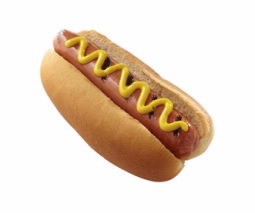FOR IMMEDIATE RELEASE
ACS News Service Weekly PressPac: December 07, 2011
Shedding light on why it is so 'tough' to make healthier hot dogs
“Infrared Study of Structural Characteristics of Frankfurter Formulated with Olive Oil-in-Water Emulsion Stabilized with Casein As Pork Backfat Replacer”
Journal of Agricultural and Food Chemistry
In part of an effort to replace animal fat in hot dogs, sausages, hamburgers and other foods with healthier fat, scientists are reporting an advance in solving the mystery of why hot dogs develop an unpleasant tough texture when vegetable oils pinch hit for animal fat. A report on their study appears in ACS’ Journal of Agricultural and Food Chemistry.
Anna M. Herrero and colleagues explain that some brands of sausage (frankfurters) have been reformulated with olive oil-in-water emulsion as a source of more healthful fat. With consumers gobbling up tens of billions of hot dogs annually, and the typical frankfurter packing 80 percent of its calories from fat, hot dogs have become a prime candidate for reformulation. Some hot dogs reformulated with vegetable oil develop an unpleasant chewy texture. Herrero’s team set out to uncover the chemistry behind that change with an eye to guiding food companies to optimize low-fat sausage manufacture.
Using a laboratory instrument called an infrared spectrometer (IR spectrometer) they verified that sausages made with heart-healthy olive oil-in-water emulsion stabilized with casein were slightly tougher. However, when frankfurters were elaborated with an emulsion stabilized with a combination of casein and microbial transglutaminase (to help the oil blend in better) the sausage became much tougher. The IR spectrometer revealed that the proteins and fats in low-fat cooked derivates formulated with this stabilizer system as animal fat replacer showed weak lipid-protein interactions, which implies more physical entrapment of the emulsion within the meat matrix. This fact could explain why those sausages are tougher than the others.
The authors acknowledge funding from the Plan Nacional de Investigación CientÍfica, Desarrollo e Innovación Tecnológica (I+D+I), the Consolider-Ingenio 2010: CARNSENUSA and Ministerio de Ciencia y TecnologÍa.
![]()

Contact
Science Inquiries: Michael Woods, Editor, 202-872-6293
General Inquiries: Michael Bernstein, 202-872-6042


